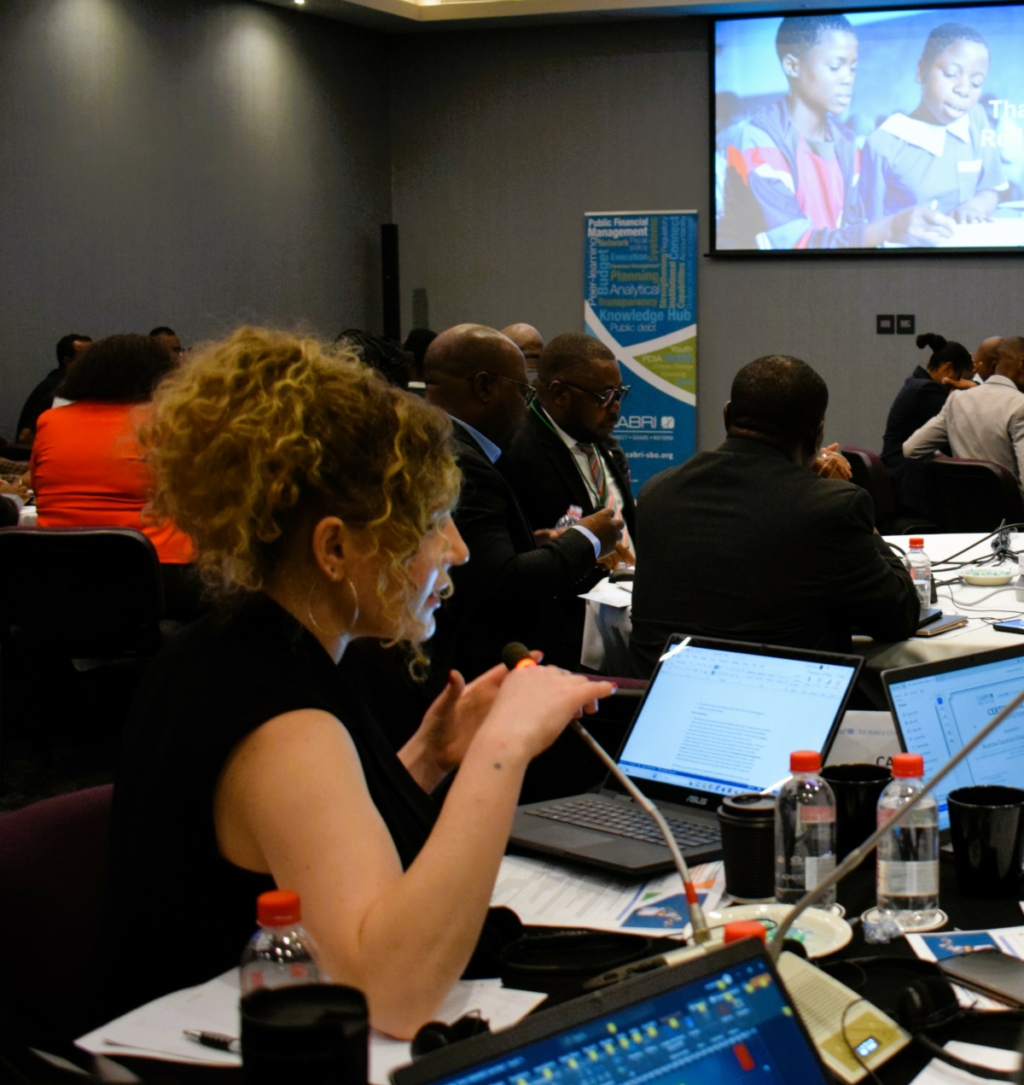
Danielle Serebro, Programme Manager at CABRI led the 2023 BPFCC programme
Between November 2022 and November 2023, cross-cutting teams from ministries of finance, health, education, and local government across Malawi, Mozambique, Somalia, Zambia and Zimbabwe participated in the CABRI-UNICEF joint Building Public Finance Capabilities for Children (BPFCC) programme.
At a progress-review workshop on 7-8 November 2023, in Cape Town, teams reflected on their achievements, and received feedback from their counterparts in other countries. In line with the problem-driven iterative adaptation (PDIA) approach, teams are encouraged not to only regard outcomes as a measure of progress or achievement. The iterative and adaptative nature of the process means that progress includes challenging assumptions, deepening understanding, and testing new inputs and outputs. Achievements and next steps planned for January to June 2024, highlighted by the team in their presentations (see below) are listed in the textbox below:
| Country and problem statement | Achievements | Next steps |
|---|---|---|
| Malawi: Inequitable and insufficient financial resources and limited autonomy of health facilities impedes their ability to plan and forecast their needs, budget, execute funding, and monitor expenditure. | • Documented lessons from the education sector’s experience with school autonomy and conditional grants. | • Develop an intra-district resource allocation formula for financing facilities. |
| • Undertook field visits to six districts to understand resource use and needs at facilities and identify impediments to introducing provider autonomy. | • Engagement with the Ministry of Finance on this formula and increasing allocation for the health sector to enable direct financing. | |
| • Held a national stakeholder consultation workshop where they presented their problem statement and proposed action ideas. | • Pilot direct financing in selected districts from April 2024. | |
| • Completed a study visit in Tanzania to learn from their experience of implementing direct facility financing. | ||
| Mozambique: Weak implementation of transversal sectoral programmes has resulted in inefficiencies, including duplication, inequitable allocation of resources and ineffective spending. | • Held a workshop with relevant line ministries to gain insight into the problem statement. Line ministries highlighted the causes of the problem including weak intersectoral coordination, poor planning and budgeting processes, the lack of policy evaluation culture, and limited staff training. | • Continue review of the planning and budgeting process. |
| • Attempted to refine planning and budgeting manuals for intersectoral programmes (although the team came up against resistance for this, requiring further stakeholder sensitisation). | • Finalise the review and updating of programme portfolio indicators. | |
| • Analysed the public investment cycle to determine where key bottlenecks to effective implementation lie. | • Implementation of Phase II of the allocation of budgetary limit to programmes. | |
| Somalia: Execution rates for donor-funded projects in health and education were 16% and 35% in 2022, respectively. This has contributed to 60% of children being out of school and one of the highest under-five mortality rates in SSA. | • Sensitised stakeholders in the health and education sectors on the importance of budget credibility. | • Develop and roll out a PFM capacity building plan for the health and education sectors. |
| • Surveyed 34 officials in the Ministries of Health and Education. | • Capacitate and restructure finance departments through the establishment of units with budget management responsibilities within Health and Education Ministries. | |
| • A report was developed covering technical skills and institutional gaps and recommending a way forward. | ||
| Zambia: Low own-source revenue and a collection efficiency rate of 37% in local authorities has led to inadequate provision of social services, ultimately perpetuating poverty. | • Held a workshop with four districts to further deconstruct the key causes of low own-source revenue. | • Local authorities to develop own-source revenue strategies and a service charter. |
| • Held a workshop with four districts to further deconstruct the key causes of low own-source revenue. | • Local authorities to consider introducing e-levy payments. | |
| • In the Katete district, the team supported: (1) capacity building with revenue collectors, (2) updating the taxpayer database and (3) a strategy for enhancing own-source revenue. | • Officials in Katete will engage traditional leaders on taxes on properties that are on customary land. | |
| Zimbabwe: Underutilisation of the non-wage budget for primary and secondary education contributes to insufficient numbers of schools, inadequate infrastructure and learning materials, and more than two million children out of school. | • Begun development of a manual for accounting procedures in the Ministry of Education. | • Extend the mandate of the budget execution committee to include a review of value-for-money in budget execution. |
| • Advocated for the allocation of accountants to each education budgetary programme. | • Continuous training of staff on procurement processes. | |
| • Monthly budget committee meetings have been established to review budget execution rates. | • Continue consultations on the preparation of the accounting procedures manual. | |
| • Engagement between the Ministry of Finance and the Ministry of Education has strengthened, resulting in timelier releases of funds. |
Beyond these measures of progress, the teams expressed that this programme supported new ways of thinking and working. It allowed sector ministries to engage on finance problems more directly and authoritatively, and for finance ministries to understand the sectors’ perspectives. According to participants, it encouraged “collaboration and exchange of knowledge”; “data analysis to optimise financial management and improve decision making”; and “cross-cutting teamwork was effective for dealing with PFM [which] requires a multifaceted approach”.
In June 2024, we will bring the teams from our first cohort back to hear about the progress they have made post-progress review. A call for applications for the second cohort will also be disseminated in mid-2024. Several lessons have been distilled from our first cohort promising to support even more progress and peer-learning going forward, ultimately contributing to better PFM for social services.